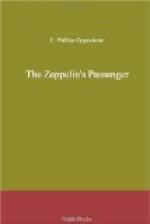The vicar nodded benignly. He had the utmost respect for Mrs. Johnson’s cook, and his own standard of social desirability, to which the object of their discussion had attained.
“I should be happy to meet Mr. Lessingham at any time,” he pronounced, with ample condescension. “I noticed him in church last Sunday morning.”
CHAPTER XX
“My dear man, whatever shall I do with you!” Philippa exclaimed pathetically, as the door closed upon the last of her callers. “The Guards, indeed!”
Lessingham smiled as he resumed his place by her side.
“Well,” he said, “I told the dear lady the truth. You will find my name well up in the list of the thirty-first battalion of the Prussian Guards.”
She threw herself back in her chair and laughed. “How amusing it would be if it weren’t all so terrible! You really are a perfect political Raffles. Do you know that this afternoon you have absolutely reestablished yourself? Mr. Johnson will probably call on you to-morrow—they may even ask you to dine—the vicar will write and ask for a subscription, and Dolly Fenwick will invite you to play golf with her.”
“Do not turn my head,” he begged.
“All the same,” Philippa continued, more gravely, “I shall never have a moment’s peace whilst you are in the place. I was thinking about you last night. I don’t believe I have ever realised before how terrible it would be if you really were discovered. What would they do to you?”
“Whatever they might do,” he replied, a little wearily, “I must obey orders. My orders are to remain here, but even if I were told that I might go, I should find it hard.”
“Do you mean that?” she asked.
“I think you know,” he answered.
“You men are so strange,” she went on, after a moment’s pause. “You give us so little time to know you, you show us so little of yourselves and you expect so much.”
“We offer everything,” he reminded her.
“I want to avoid platitudes,” she said thoughtfully, “but is love quite the same thing for a man as for a woman?”
“Sometimes it is more,” was the prompt reply. “Sometimes love, for a woman, means only shelter; often, for a man, love means the blending of all knowledge, of all beauty, all ambition, of all that he has learned from books and from life. Sometimes a man can see no further and needs to look no further.”
Philippa suddenly felt that she was in danger. There was something in her heart of which she had never before been conscious, some music, some strange turn of sentiment in Lessingham’s voice or the words themselves. It was madness, she told herself breathlessly. She was in love with her husband, if any one. She could not have lost all feeling for him so soon. She clasped her hands tightly. Lessingham seemed conscious of his advantage, and leaned towards her.




